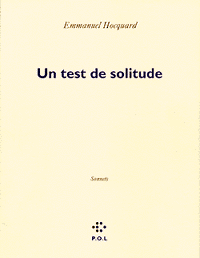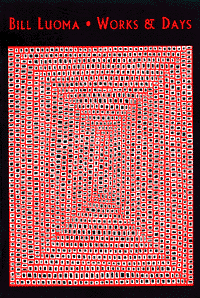
|
J A C K E T # 5 |
|
this material is copyright © Steve Evans and Jacket magazine 1998 The URL address of this page is http://jacketmagazine.com/05/evans-r2.html please read the copyright notice and see the links at the foot of the page back to Jacket # 5 contents page back to Jacket's homepage |
| | Steve Evans reviews . . . |
|
| | Emmanuel Hocquard's "Un test de solitude" (Paris: POL, 1998) Bill Luoma's "Works & Days" (West Stockbridge: The Figures / Hard Press 1998) |
|
| |
"The poem is at last between two persons instead of two pages. In all modesty, I confess that it may be the death of literature as we know it." -- Frank O'Hara Emmanuel Hocquard's "Un test de solitude" (Paris: POL, 1998) EMULATING WITTGENSTEIN, who repaired to an isolated cabin in Norway to write and reflect, Hocquard takes up his own test of solitude on an artist friend's farm in Bouliac, not far from Bordeaux. What he writes there are unconventional sonnets, two sets of them (thirty-three and twenty-five poems each), that arrive at their stipulated line-count by an ingenious variety of means. Justified prose, centered verses, shaped text, stanzaic poems where the space between stanzas "counts" as a line, all work to relieve the sonnet form of its burdensome regularity, leaving at most the broken profile of the post-Spicerian lyric in its place. Addressed to a single recipient, a woman named Viviane known to the poet because he buys bread from her in Fargues, the sonnets record with deceptive simplicity Hocquard's quotidian actions and experiences - visiting and receiving friends, lecturing on Stein to architects, working on collaborative projects with the painter Alexandre Delay, registering events in calendar time and all weathers. At the same time, an inquiry is being conducted, a test of solitude that is also a test of poetry. It commences with an ordinary statement, at once empty and obvious: "Viviane is Viviane." An admiring statement, a sociable statement, an altogether comprehensible statement; but a statement also of the solitude peculiar to tautology, where syntax, subject, author, and predicate find their normal operations suspended and language seems to hover at its vanishing point. Each sonnet's task is to test this limit in a new way, and thereby to describe a new space: sometimes it is the space between two occurrences of a single word (Viviane is Viviane), sometimes the distance between two objects (a canal and a burnt tree trunk), or sites (a desk in Bouliac and a boulangerie in Fargues), sometimes between two aesthetic artifacts (a film called Voyage à Reykjavik and a book called Voyage à Reykjavik), but always, emphatically, the attention falls on what comes between: |
|
| |
That which separates two words is like that which separates two loaves or two wasps. Region of fluctuating limits. Viviane with her breads in the broken space of the boulangerie like me with my words facing the screen. This says: "I remember Viviane." Bits of bread or bits of language between which connections Traces of the wolves that sing between the canale and the burnt trunk. January first, my table a waste land under the sun. | |
| |
(Those enigmatic wolves - escaped from the same zoo as the rhinoceros Wittgenstein claimed was crossing the room - serve to define by their "song" various interior and exterior spaces of the book.) While Hocquard's method, one of envelopment rather than development, cannot properly be said to advance, certain new motifs do emerge in the volume's latter half. The theme (or theory) of the secret, for instance, as "Viviane is Viviane" gets entered into the ledger of secrets Hocquard finds himself not so much in possession of as inescapably addressed by ("la liste des / secrets qui le sont pour moi"). And on a formal level the list itself, like the tautology in one respect at least, that of defying the conventional sentence: "'Viviane I love you' is a list not a / sentence." (Here and elsewhere one notes echoes of Hocquard's close engagement with Pierre Alféri's small book, Chercher une phrase, excerpted in Joseph Simas's translation as "Seeking a Sentence" in the new Poetics Journal.) If "grammar and fiction are one," as the final line of the last sonnet rather forbiddingly states, it is precisely for this reason that they do not altogether concern us. By writing "in two" (into the space between two) - by making this gift to Viviane, by publishing his "sonnets of Viviane" - Hocquard involves us in a sincere and affirmative intimacy that acknowledges even as it dissolves solitude. Amicable, agrammatical, respectful, and literal: how it should be entre nous.
While Hocquard's method, one of envelopment rather than development, cannot properly be said to advance, certain new motifs do emerge in the volume's latter half. The theme (or theory) of the secret, for instance, as "Viviane is Viviane" gets entered into the ledger of secrets Hocquard finds himself not so much in possession of as inescapably addressed by ("la liste des / secrets qui le sont pour moi"). And on a formal level the list itself, like the tautology in one respect at least, that of defying the conventional sentence: "'Viviane I love you' is a list not a / sentence." (Here and elsewhere one notes echoes of Hocquard's close engagement with Pierre Alféri's small book, Chercher une phrase, excerpted in Joseph Simas's translation as "Seeking a Sentence" in the new Poetics Journal.) If "grammar and fiction are one," as the final line of the last sonnet rather forbiddingly states, it is precisely for this reason that they do not altogether concern us. By writing "in two" (into the space between two) - by making this gift to Viviane, by publishing his "sonnets of Viviane" - Hocquard involves us in a sincere and affirmative intimacy that acknowledges even as it dissolves solitude. Amicable, agrammatical, respectful, and literal: how it should be entre nous.Bill Luoma's "Works & Days" (West Stockbridge: The Figures / Hard Press 1998). LUOMA'S WONDERFUL BOOK shares with its Hesiodic namesake more than a few characteristics. Both arise from experiences of devastating loss (Hesiod of his patrimony to a conniving brother; Luoma of his wife, the poet Helena Bennett, to cancer). Rather than narrating a single grand action, both texts cobble together sayings, tales, empirical observations, and flights of lyricism. Both mix naivete of tone with a didactic aim, blending instruction in life's conduct with wonder at its contents. |
|
| |
 Bill Luoma And both are texts that speak with what Hesiod calls "a sparing tongue" ("the best treasure a man can have is a sparing tongue, and the greatest pleasure one that moves orderly") and contemporary sociolinguist Basil Bernstein christened "restricted code" (condensed, context-dependent symbolic action embedded in affective social bonds, as opposed to the reflexive, universal, and rational pole of the "elaborated" code). But for all their appearance of simplicity, these are eloquent and subtle texts, peopled, storied, principled, humorous, and moving. |
|
| |
In his entropic wanderings from San Diego to New York and Providence ("My Trip to New York"), through the minor-league ballparks of the American south ("12 Peanuts & an Easton"), to San Francisco ("We Were in Burrito" and "The Replacements"), back to New York ("Auto Gobbler," "Tradition: An Allegory," and the "Ear in Reading Reports"), down to Philadelphia ("Illegal Park"), over to France ("The Annotated My Trip to NYC"), and eventually to Hawaii ("KPOI 97.5 The Rock You Live On"), Luoma follows a principle rendered explicit in a passage from "The Replacements" (where a lost metal cleat exercises all the motivating force of Lacan's objet petit a): |
|
| |
| |
| |
In this particular updating of the situationist dérive Luoma is for the most part alone: as in the other San Francisco-based text, "We Were in Burrito," an air of isolation and melancholy pervades; even the food is in a style the narrator has "come to expect but will never endorse." Almost everywhere else in the book, however, the project of "naming things along the way" is a collective one, involving a throng of flirtatious strangers, odd acquaintances, and close friends, among the latter of whom the hilarious, idiosyncratic pair of Brian and Douglass stand paramount as slapstick muses forever in mid-routine: |
|
| |
O man there was this big huge guy. Did you see the big huge guy? Douglass asked us this when we got out of the liquor store. We had to get some scotch and I picked up a bottle that wasn't in the scanner's database. They had to do a time-consuming price check. While we were waiting Brian predicted that Douglass would be real proud of me for causing such a stir. (21) | |
| |
Here the phenomenon of "time-consuming price checks" on commodities unrecognized by "the scanner's database" is brought to poetry with the precision of Hesiod telling Perses how and when to clip his fingernails or where and in which direction to stand when urinating, but the real focus of the passage is the magic of masculine admiration, capable of transmuting a boring dead-space in the life of consumerism into an act of quasi-heroic system jamming (a theme more concertedly pursued in "Astrophysics & You"). This is not to imply that Luoma shares Hesiod's - or even Jack Kerouac's - misogyny: no Pandora is loosed to explain the degeneration of men, except perhaps in an occasional aside by Douglass. In fact, the narrator's love of specific women - Helena, Margot, Kate, Juliana - and friendship with others - Jennifer, Cindy, Lisa, Marlene - is amply apparent in Works & Days, but unlike in the sumptuous and graphic "My Lover" poems (published in The Impercipient 7 and The World 53, 1995 and 1997 respectively) and the genre-stylized Western Love chapbook (New York: Situations, 1996), this love does not form the principle compositional interest.  That remains the interaction between men, expressively constrained, silly, cranky, heroic, sweet, as recorded in discrete paragraphs whose frame-by-frame progression recalls a slideshow ("the paragraphs" of "My Trip" are "all slides, by the way," Luoma writes in his annotations to the work first published by The Figures in 1994 and collectively translated into French in 1997 for Juliette Valery's Format Américain series; "These slides are for Scott another San Diego friend who wanted me to send him some") or the baseball boxscores appearing on successive days in the newspaper (as Luoma explains in "12 Peanuts & An Easton": "A box score is good in the morning for many reasons. For example, it's good to know how long games lasted, the umpires' names and how many double plays were turned. It's also good for small talk" - all of which applies, mutatis mutandi, to the genre-founding "reading reports" in the volume's latter half). In either analogy it is clear that these reports derive their tone and function from being for someone (for Scott, or in the "KPOI" sequence for Charles who "never sees any of this so then this is for him").
That remains the interaction between men, expressively constrained, silly, cranky, heroic, sweet, as recorded in discrete paragraphs whose frame-by-frame progression recalls a slideshow ("the paragraphs" of "My Trip" are "all slides, by the way," Luoma writes in his annotations to the work first published by The Figures in 1994 and collectively translated into French in 1997 for Juliette Valery's Format Américain series; "These slides are for Scott another San Diego friend who wanted me to send him some") or the baseball boxscores appearing on successive days in the newspaper (as Luoma explains in "12 Peanuts & An Easton": "A box score is good in the morning for many reasons. For example, it's good to know how long games lasted, the umpires' names and how many double plays were turned. It's also good for small talk" - all of which applies, mutatis mutandi, to the genre-founding "reading reports" in the volume's latter half). In either analogy it is clear that these reports derive their tone and function from being for someone (for Scott, or in the "KPOI" sequence for Charles who "never sees any of this so then this is for him").Musing on Robert Creeley's "I Know a Man" in his annotations to "My Trip" - a work on whose opening page Creeley's "goddamn big car" is reduced to an irreparable and irretrievable state, the first of the many wrecks, breakdowns, and tow-aways strewn throughout Works & Days - Luoma explains his commitment to this form of poetic address |
|
| |
I think Creeley had the right idea: it's 'good' that the darkness surrounds us because it makes us form communities. Write poems for your friends to help keep them alive while you try to watch out where you're going reading the poems your friends write for you. Dharmok and Jilad at Tenagra. Ginsberg and Kerouac at the Sunflower. Kevin & Dug & Lisa in Nogo. I think that's the good the bad and the lovely of it. ps your friends die anyway. (132) | |
| |
As with Frank O'Hara, whose commitment to "personism" cannot be understood apart from its elegiac origins, what might seem glib or cliquish in Luoma's project is lent weight and dimension by the tragic-elegiac "darkness" that surrounds - and sometimes falls directly upon - his naive-seeming page. Writing across that pocket where, as Hesiod knew, "the gods keep hidden from men the means of life," Luoma opens to us the community of life and death, where numbered days are our most important works. His poems befriend us and keep us going, naming things along the way. |
|
| |  This review is taken from Notes to Poetry number 40, by Steve Evans (left), an American writer currently living in Paris. The Notes to Poetry series is an irregular series of reviews written by Steve Evans and circulated among his friends as they accumulate. The numbers in the heading refer not to consecutive issues but to the week in 1998 when the works were read and commented on. Installments exist in the following discrete series 1, 2, 3, 5, 12, 14, 15, 17, 18, 22, 25, and 34. A collectively authored mid-year installment (26) also contains a table of contents for weeks 1-26.
This review is taken from Notes to Poetry number 40, by Steve Evans (left), an American writer currently living in Paris. The Notes to Poetry series is an irregular series of reviews written by Steve Evans and circulated among his friends as they accumulate. The numbers in the heading refer not to consecutive issues but to the week in 1998 when the works were read and commented on. Installments exist in the following discrete series 1, 2, 3, 5, 12, 14, 15, 17, 18, 22, 25, and 34. A collectively authored mid-year installment (26) also contains a table of contents for weeks 1-26.For those who might wish to be added to the mailing list for the Notes to Poetry series, Steve Evans can be emailed at Moxley_Evans@compuserve.com An earlier notice of Works & Days, by Ben Friedlander, can be found in Note 26c of the Notes to Poetry series. Emmanuel Hocquard's contribution to Action poetique 151 (Summer 1998) - which includes Viviane's selection of 10 sonnets from the Un Test de Solitude - was briefly mentioned in Note 25. Contact and ordering information: The Figures / Hard Press, PO Box 184, West Stockbridge, MA 01266 (Hard Press with its stablemate lingo magazine are on the Internet at http://hardpress.com/) Format Américain, c/o Juliette Valery 37 rue Sainte-Colombe, 33000 Bordeaux, France P.O.L., 33, rue Saint-Andre-des-Arts, 75006, Paris Small Press Distribution 1-510-524-1668 or 1-800-869-7553 (USA) Bridge Street Books (Rod Smith) 1-202-965-5200 (USA) AERIALEDGE@aol.com Emmanuel Hocquard : links Founded by Emmanuel Hocquard in 1989, the non-profit association Un bureau sur l'Atlantique continues to advance the knowledge of American contemporary poetry in France, by: inviting to France American poets and regular programming of events : collective translation seminars, readings, meetings; and publishing translations : anthologies, Un bureau sur l'Atlantique series of books, Format Américain + Le «Gam» series. Un bureau sur l'Atlantique is supported by the Centre National du Livre and the Centre de Poésie & Traduction at Fondation Royaumont. You can connect directly with the Bureau via the EPC site in Buffalo, New York. The site is bilingual in French and in English. Bill Luoma : links http://socrates.berkeley.edu/~moriarty/2/luoma.htm which is Laura Moriarty's Internet magazine non, and http://www.ubu.com/contemp_frames.html> (Kenny G's ubu site) and http://www.idiompress.com/issue_1/contentspage.html, which is idiom magazine, and contains a review of Western Love by Adam Degraff. Basil Bernstein's "Language and Socialization" was first given as a talk at the Institute of Contemporary Arts in London, as part of their 1969/70 series on linguistics; like the other talks from that series, it appeared in the 1971 volume Linguistics at Large, ed. Noel Minnis. Citations from Hesiod are in Hugh G. Evelyn-White's translation for the Loeb Classical Library (Cambridge and London: Harvard UP, 1936): "And look after the dog with jagged teeth; do not grudge him food, or some time the Day-sleeper may take your stuff." |
| J A C K E T # 5 Back to Jacket # 5 Contents page Select other issues of the magazine from the | Jacket catalog | Other links: | top | homepage | bookstores | literary links | internet design | Copyright Notice - Please respect the fact that this material is copyright. It is made available here without charge for personal use only. It may not be stored, displayed, published, reproduced, or used for any other purpose | about Jacket | |